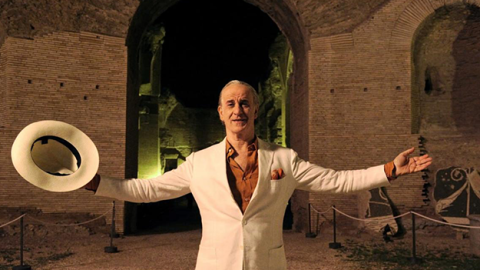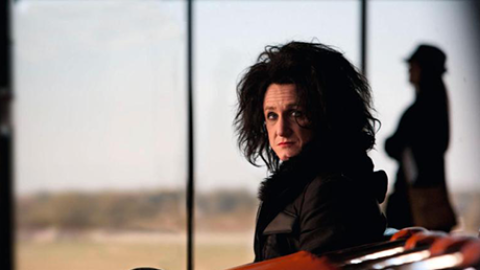Film of the Week: Youth
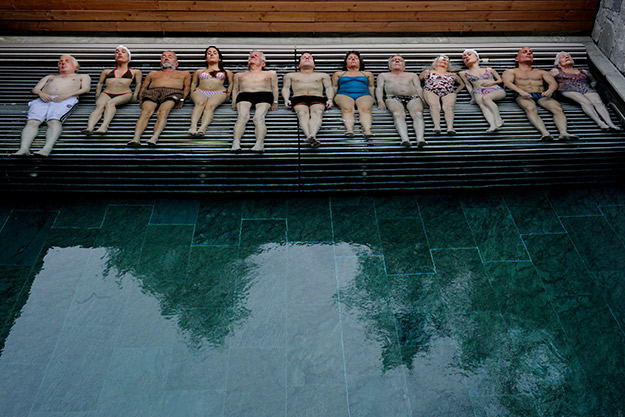
Here’s the thing. As a rule, I get as much pleasure—as much sheer fun—out of Paolo Sorrentino’s work as I do from that of just about any filmmaker. And I probably had as much pleasure from his new film Youth as I did from anything else this year. Yet I have to admit that it sometimes becomes glaringly apparent that Sorrentino is not what you’d normally think of as a great filmmaker—at moments, you find yourself wondering just how in control he is of his material. None of his films has had me doubting his qualities quite like Youth—just as his last one, The Great Beauty, confirmed my certainty of his brilliance. Still, there are probably not that many filmmakers around today who can impress you with their inspiration and their vacuity, their sublimity and their crassness, from one film to the next—still less in the space of a single movie. This surely distinguishes Sorrentino as, at the very least, a fascinating anomaly.
There are two main accusations that often get leveled at Sorrentino—one, that he too often indulges banality, the other that he doesn’t know when to stop. In Youth, he’s guilty of both sins. As far as the latter is concerned, take the ending. Michael Caine plays Fred Ballinger, an elderly English composer whose output contains a particular albatross—a work named Simple Songs so popular that it is both practiced by child musicians and beloved of HRH Prince Philip, for whom Queen Elizabeth would like Ballinger to conduct the piece at a birthday concert (one thinks of such “holy minimalism” blockbusters as Gorecki’s Third Symphony or John Tavener’s The Protecting Veil). We get hints of what Ballinger’s piece might sound like, and intimations that it might be a sublime composition—but should we actually hear it? Of course we shouldn’t—you know that, I know that, but Sorrentino doesn’t. At the very end of the film, he gives us Ballinger’s creation, as imagined by composer David Lang, and performed on stage by real-life soprano Sumi Jo, while the camera swoops rhapsodically over the orchestra. Regardless of whether or not you like the music’s directness and lushness (and I very much didn’t), you immediately sense the film’s ideal ending—Ballinger walks on stage, lifts his baton, cut to black, silence, end credits. Being a compulsive maximalist, Sorrentino wouldn’t have done that in a million years.
In one line of his English-language script, the writer-director seems to be making a pre-emptive joke against himself: someone says of life that it’s a “tremendous effort… with a modest result.” Sorrentino often seems to take a lot of trouble for relatively little payoff. For example, a marginal character in the film is a Tibetan monk reputed to levitate, but believed by some to be a phony. Sure enough, Sorrentino and regular DP Luca Bigazzi have gone to some length to concoct a gorgeous, teasing shot that slowly glides over the monk’s head and shoulders to reveal that in fact… Well, you’ve guessed it already—and indeed, we often feel in Youth that we’re way ahead of the film’s characters and even of the camera.
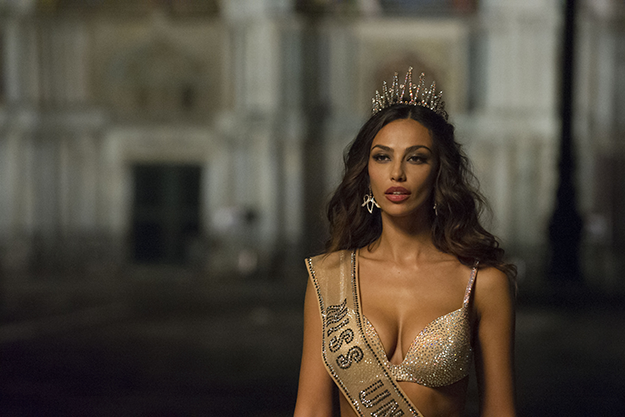
There is a lot in Youth that’s both highly obvious and familiar from the director’s filmography. I’ve heard and seen it said more than once that if The Great Beauty was Sorrentino’s remake of La Dolce Vita, then Youth is his 8 1/2: set in a luxurious spa hotel, it’s about artists grappling with their doubts, inadequacies, and creative vacancies. Youth is largely about the friendship between two elderly men who are also in-laws: Ballinger’s daughter Lena (Rachel Weisz) is married to the son of film director Mick Boyle (Harvey Keitel). World-weary Ballinger doesn’t seem to have written or otherwise worked for years, while Boyle has settled in at this gorgeous Alpine retreat with a cadre of eager young writing assistants, to complete the script for his new movie. It’s to be his ultimate testament, and is called Life’s Last Day (it’s hard to know whether Sorrentino intended this as a joke on auteur pomposity, or whether it just sounded better in Italian). The two old men gossip, joke, and bicker—like Statler and Waldorf dropped into Thomas Mann’s The Magic Mountain—about the other guests, who include a pneumatic Miss Universe (Madalina Ghenea) and a vast blubbery ruin of a soccer star with Karl Marx tattooed on his back (guess who Sorrentino had in mind?). There’s also a wryly narcissistic Hollywood star (Paul Dano, presumably at least semi-channeling one-time Sorrentino lead Sean Penn); he prides himself on his work with the great auteurs but is best known for the blockbuster role, playing a robot, that he’ll forever kick himself for accepting.
Miss Universe is the latest in the succession of impossibly sumptuous vamps that Sorrentino simply cannot resist in his films—modern incarnations of an eternal Venus archetype that he seems fixated on. There’s one very droll moment, a sort of modern-day Susanna and the Elders, in which this fleshly apparition strolls naked and majestic past the two bathing old codgers. “Who is she?” asks Ballinger. “God,” replies Mick. But there’s also a scene in which the beauty queen is treated with lofty condescension by the actor and, guess what, turns the tables on him by replying with elegant, philosophical grace and wisdom: who’da thunk it? This is the kind of thing that often passes for surprise reversal in Sorrentino’s films, but it’s not done with consistency; the next time she appears, in the bath, she’s reverted to being just a haughty image.
The unreconstructed sexism of Sorrentino’s films can sometimes be, at a stretch, semi-excused by locating it in a certain Italian cinematic tradition of objectifying goddess figures. It also means other women get a rough deal. The Good Sport of 2015 Award must go to British singer Paloma Faith for accepting her role—and a Chutzpah Award to Sorrentino for devising it. Lena, it turns out, has been abandoned by her husband in favor of a somewhat nondescript woman who accompanies him to the hotel. She’s clearly some whore, spits Mick. The woman steps up: “I’m Paloma Faith, and I’m not a whore, I’m a singer.” Faith—dubbed by Mick “the most insignificant woman on the face of the planet”—reappears in a wildly ostentatious music video that turns out to be Lena’s nightmare.
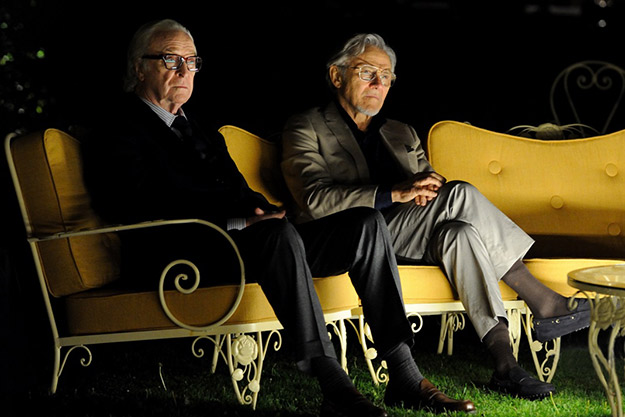
It’s an audaciously bizarre touch, startling because it’s so wildly unnecessary—but then there’s very little in a Sorrentino film that isn’t unnecessary in customary narrative terms. And because so much is potentially superfluous, it all somehow feels absolutely essential—as if the entire texture were made up of a whole lot of too much. By the same token, Sorrentino could easily have dumped the entire sequence in which Dano’s actor turns up playing Hitler. Yet Youth wouldn’t have been nearly as much fun without it: it’s the very digressiveness that makes it priceless. (Among other stuff that he seems to throw in for the hell of it, like “bonuses”: singer-guitarist Mark Kozelek entertaining the guests, a fabulous sight gag with the footballer still doing his stuff, a parachutist who literally drops in out of nowhere.)
By the same token, the scene in which Mick is reunited with his lifelong muse, Hollywood actress Brenda Morel, could easily have felt feel like one extended grating false note—and I imagine the dialogue would read very flatly on paper. Yet the scene is extraordinary—because Brenda is played by no less a Hollywood deity than Jane Fonda. She turns in a show-stopping performance of incendiary harshness that appears to be one part Norma Desmond, several parts a hellish cartoon of Faye Dunaway.
The film consistently dwells on one theme: Youth is indeed “a simple song,” far from the symphonic complexity of The Great Beauty. That theme is the contrast between youth and age, with the expected attendant binaries: ugliness versus beauty, the mortality of the flesh versus the longevity, however illusory, of art. Sorrentino delights in juxtaposing freshness and decrepitude: a young masseuse’s silky hands on Caine’s parchment-like flesh. He and Bigazzi film the hotel guests sitting around like dead souls biding their time in the steam rooms of purgatory: there’s nothing surprising per se about such images, and yet it’s done with arresting beauty, chiaroscuro segmenting their bodies like fragments of Roman statuary, all set to the funereally glum “Berceuse” from Stravinsky’s Firebird. It’s done with the sort of grace that can turn obviousness into archetype—and the film’s grace throughout owes much to the somber opulence of Ludovica Ferrario’s production design.
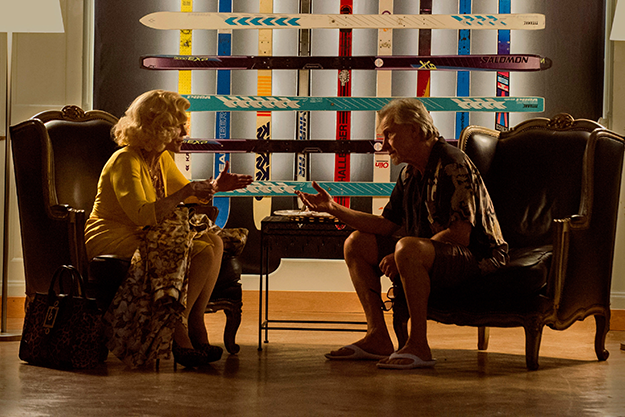
Much of the dialogue falls flat, especially given a certain clunkiness to the English. The acting, however, is relishable: not least a supporting part by Alex MacQueen, a stalwart of British TV comedy who does flustered English prissiness better than anyone since the late Richard Wattis. Rachel Weisz is also extraordinary, a universe away from the cultivated stiffness of The Lobster. There’s another ostensibly obvious scene: an interlude in the spa’s mud room, with her giving Fred a by-the-book dressing-down for his paternal failings. But we’re given a long take of Weisz seen from above, just head and shoulders, and the tense modulation of her acting—evoking the angry child beneath the self-possessed sophisticate—makes for something marvelously direct and touching.
The two lead doyens are a terrific double act. Caine looks very amused to be here, and a little rueful—and not in the way he’s seemed amused and rueful about so many dud films over the years. His Ballinger seems to get a kick out of the absurdity of anyone taking him and Mick seriously, while Keitel is lovely as an artist (of probably modest talents) who takes himself way too seriously—it’s great to see Caine playing testy comic relief to Keitel’s earnest straight man.
In terms of insights, the payoffs are modest: we’re all mortal, we’re all essentially deluded, and you never can tell about people. There are points at which Sorrentino’s taste for the obvious is downright reprehensible, notably in a late, lingering shot in which a character with Alzheimer’s stares vacant or agonized from a window: it’s intrusive, exploitative, a terrible mistake.
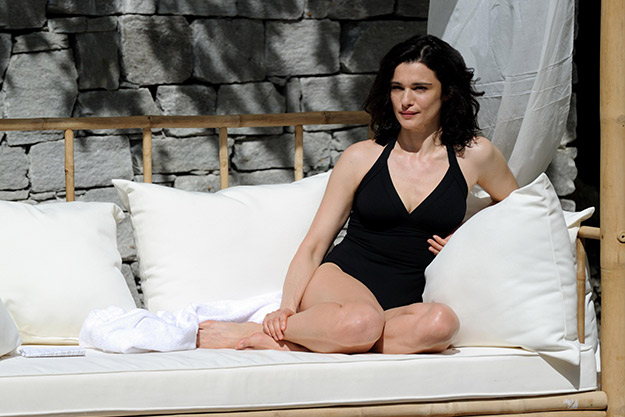
Youth is, like much of Sorrentino, glaringly, even bumptiously imperfect. And yet the brio, the flamboyance, the bullish eagerness with which he rushes into places that a more sensible director would have avoided—all this makes for a sort of mad, excessive grace. Here’s another line, and again an obvious one—but it may be a heartfelt statement of Sorrentino’s. Ballinger says about music: “You don’t need words and experience to understand it, it just is.” It’s a riposte to those of us who wish that Sorrentino was better with words and sophistication; it’s there to tell us that actually, Youth is like music, that in some way it “just is.” The aesthetes among you may say that if they want a narrative movie that “just is,” they’ll choose the diaphanous intangibility of The Assassin. Personally, I relish the riotous excess that is Sorrentino’s specialty: a sometimes cacophonous explosion of stridency, overstatement, ugliness—and yet at times, of sheer glory. The critic in me is bound to tut-tut over Youth. But as a cinephile—by which I mean someone who loves cinema, and loves the sight of a filmmaker manifestly loving cinema—I get an outrageous kick from it. It is—at least until the second that Caine raises his baton—a madcap oratorio of erratic splendor.



